
11 Best Resources on Machine Learning Recommender Systems in 2025
Welcome to our second book recommendation list! After the success of our previous collection on the best books for software engineers, we are excited to present you with a handpicked selection of the seven best books and four research papers on Machine Learning Recommender Systems to read in 2025.
Contents
- “Recommendation Engines” by Michael Schrag
- “Recommender Systems Handbook” by Francesco Ricci, Lior Rokach, and Bracha Shapira
- “Recommender Systems: The Textbook” by Charu C. Aggarwal
- “Practical Recommender Systems” by Kim Falk
- “Statistical Methods for Recommender Systems” by Deepak K. Agarwal and Bee-Chung Chen
- “Recommender Systems: Legal and Ethical Issues”by Sergio Genovesi, Katharina Kaesling, and Scott Robbins
- “Hakowanie sztucznej inteligencji” (eng. “Hacking Artificial Intelligence”) by Jerzy Surma
- 5 best introductory research papers on machine learning recommender systems
- “Hybrid Web Recommender Systems” by Robin Burke
- “Hybrid Recommender Systems: Survey and Experiments” by Robin Burke
- “Recommender systems survey” by J. Bobadilla, F. Ortega, A. Hernando, A. Gutiérrez
- “Recommender Systems in E-Commerce” by J. Ben Schafer, Joseph Konstan, John Riedl
Whether you’re a data scientist, AI enthusiast, or simply curious about the fascinating world of ML recommendations, this list is tailored to provide you with valuable resources that will enrich your understanding and skills in this rapidly evolving field.
Let’s dive in and discover the must-read materials that will help shape your journey in Machine Learning Recommender Systems in 2025!
7 Great books on machine learning recommender systems
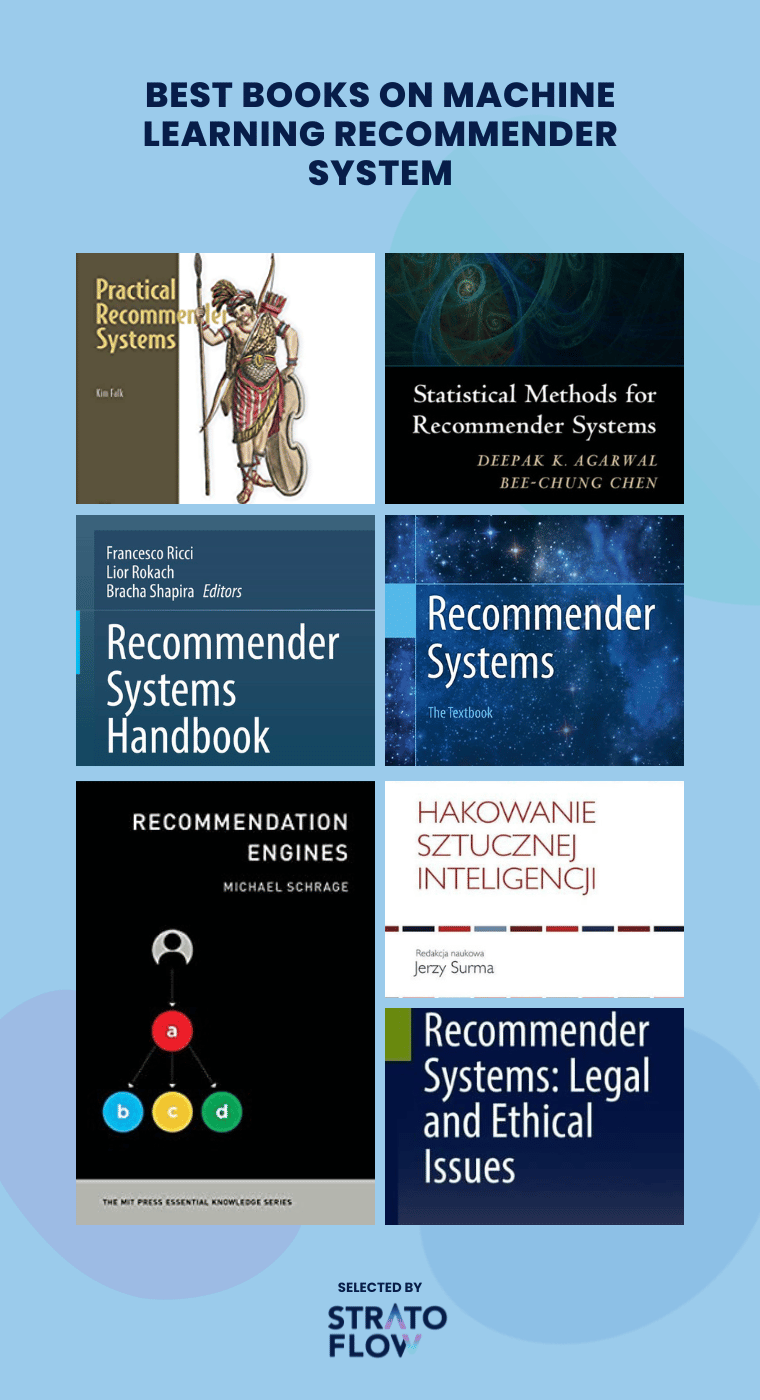
1. “Recommendation Engines” by Michael Schrag
“Recommendation Engines” by Michael Schrage provides an exploration of the history, technology, business applications, and societal impact of online recommendation engines. These engines, employed by companies like Amazon, Netflix, and Spotify, offer personalized recommendations based on user preferences and behaviors.
The book highlights how our technologies are becoming increasingly adept at providing us with advice and suggestions, often surpassing the recommendations we receive from our own families and friends. It examines how companies like Amazon are able to accurately determine the types of books and household goods that users are interested in and offer further recommendations accordingly. Similarly, platforms like YouTube, TikTok, and Netflix utilize recommendation engines to continuously provide users with tailored content based on their viewing habits.
Michael Schrage, an innovation expert, explores the origins of recommendation engines, the underlying technologies that power them, and their diverse business applications. He also examines the growing societal impact of these engines and how they shape our choices and experiences.
“Recommendation Engines” is part of The MIT Press Essential Knowledge series, which aims to provide concise and accessible introductions to various topics. The book offers valuable insights into the workings and implications of recommendation engines, making it relevant for readers interested in understanding the technology and its influence on online platforms and user experiences.
[Read also: How to Build Recommendation System: Explained Step by Step]
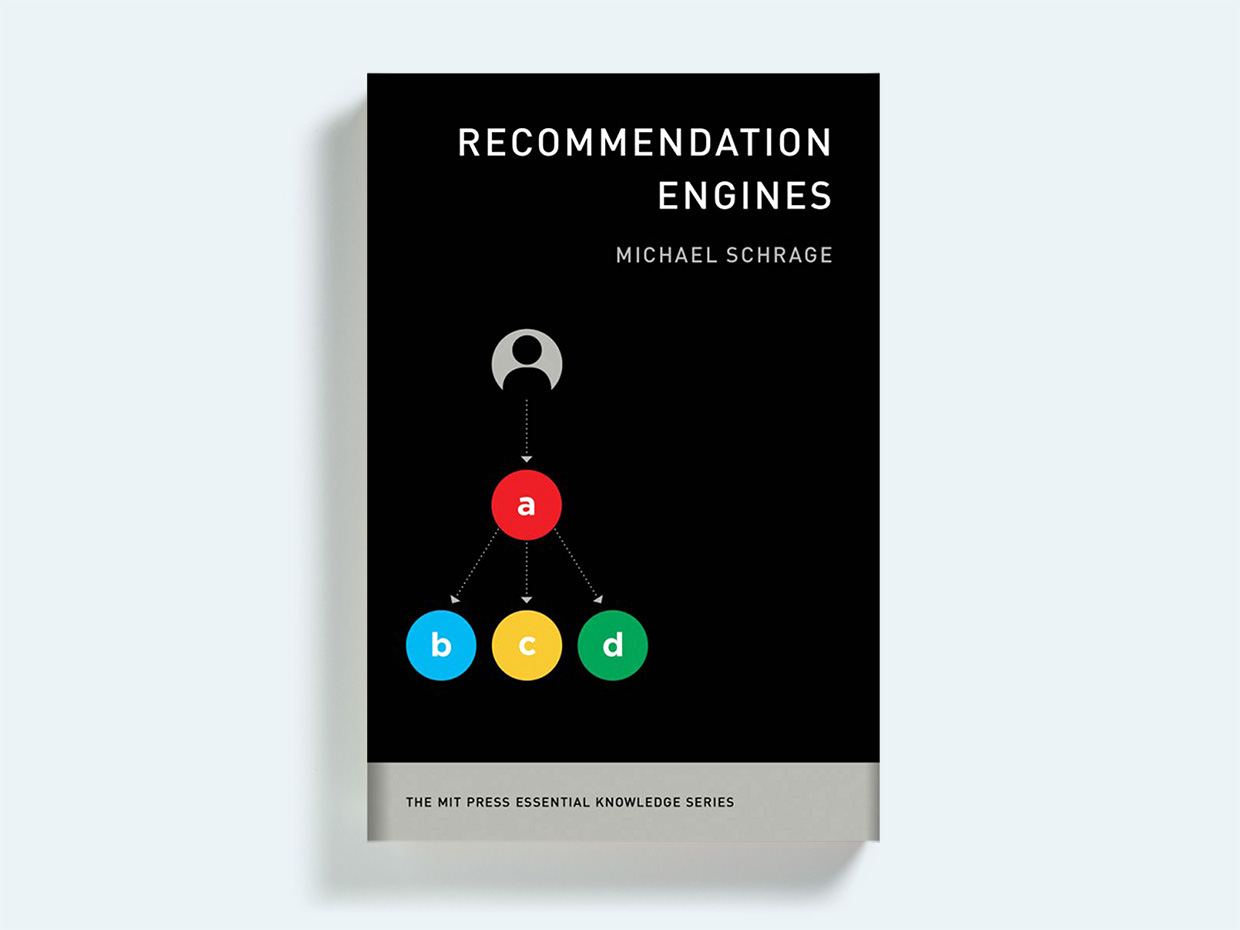
2. “Recommender Systems Handbook” by Francesco Ricci, Lior Rokach, and Bracha Shapira
The “Recommender Systems Handbook 3rd ed. 2022 Edition” is a comprehensive guide by Francesco Ricci, Lior Rokach, and Bracha Shapira. It covers various aspects of recommender systems, including classical methods, recent advancements, evaluation techniques, human-computer interaction, and applications.
The handbook is divided into five parts. The first part introduces popular techniques for building recommender systems, such as collaborative filtering, semantic-based methods, neural networks, and context-aware methods.
The second part explores advanced recommendation techniques, including session-based recommender systems, adversarial machine learning, group recommendation, natural language techniques, and cross-domain approaches.
The third part focuses on the evaluation of recommender systems, covering methods, value and impact assessment, multi-stakeholder perspectives, and fairness, novelty, and diversity analysis.
The fourth part examines the human-computer dimension, discussing the role of explanations, user personality, and effective support for individual and group decision-making using recommender systems.
The final part highlights applications of recommender systems in various domains, such as food, music, fashion, and multimedia recommendation.
This handbook serves as a concise and convenient reference for researchers and advanced-level students in computer science and data science. It is also useful for professionals in data analytics who employ recommendation and personalization techniques.
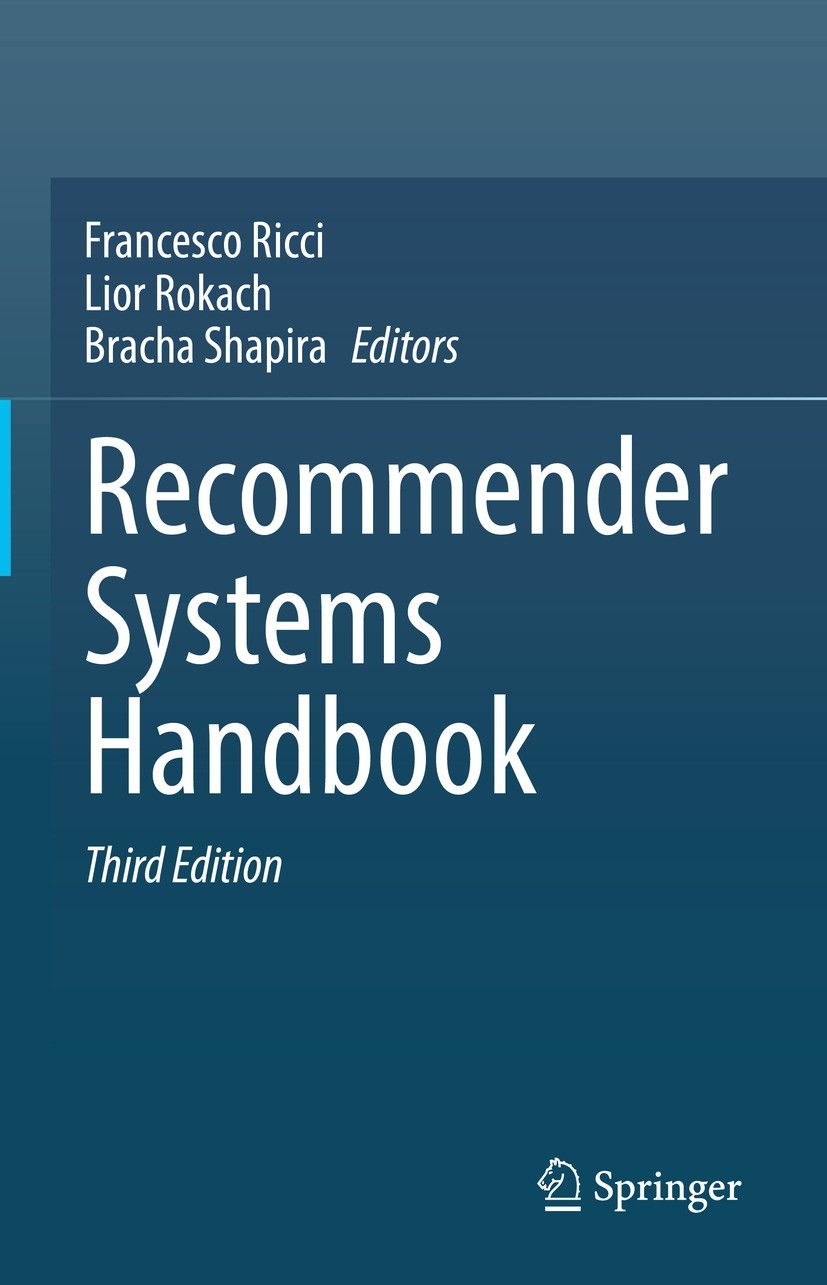
3. “Recommender Systems: The Textbook” by Charu C. Aggarwal
“Recommender Systems: The Textbook 1st ed. 2016 Edition” by Charu C. Aggarwal is a comprehensive book that covers the topic of recommender systems. It explores the methods used to provide personalized recommendations to users based on their previous interactions. The book covers both fundamental and advanced topics in the field.
The chapters in the book are organized into three categories. The first category focuses on algorithms and evaluation, discussing various recommender system algorithms such as collaborative filtering, content-based methods, knowledge-based methods, ensemble-based methods, and evaluation techniques.
The second category delves into recommendations in specific domains and contexts. It explores how different types of context, such as temporal data, spatial data, social data, tagging data, and trustworthiness, can impact the recommendation process.
The third category covers advanced topics and applications in recommender systems. It addresses robustness aspects, including shilling systems, attack models, and defense strategies. It also introduces recent topics like learning to rank, multi-armed bandits, group systems, multi-criteria systems, and active learning systems, along with their applications.
While primarily designed as a textbook, this book also caters to industrial practitioners and researchers due to its practical focus and reference material. It includes numerous examples and exercises, with a solution manual available for instructors.
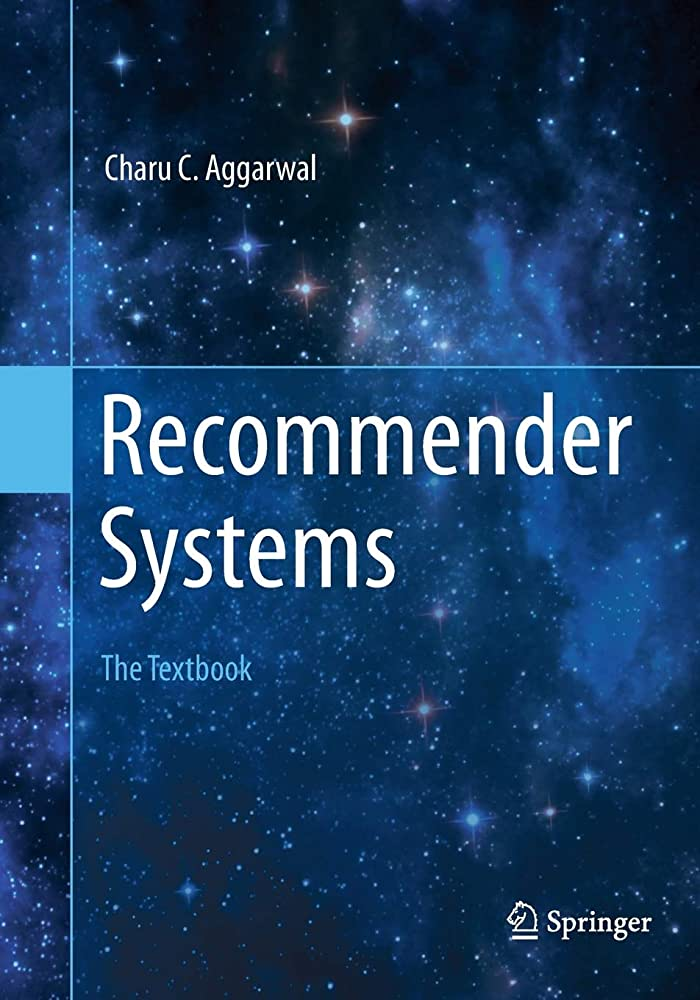
4. “Practical Recommender Systems” by Kim Falk
“Practical Recommender Systems” by Kim Falk is a book that guides readers in building effective recommender systems for various applications. It emphasizes the importance of combining statistics, demographics, and query terms to deliver personalized recommendations that can enhance user experiences.
The book begins by introducing recommender systems and their significance in today’s digital landscape. It explains how these systems utilize user data to make predictions and provide tailored suggestions. The process of collecting user behavior data and understanding it is covered in detail, along with monitoring the system’s performance. The book also explores non-personalized recommendations and the role of ratings in calculating them.
The second part of the book focuses on recommender algorithms. It covers collaborative filtering, which involves finding similarities among users and content. The evaluation and testing of recommender systems are discussed, along with content-based filtering. The concept of matrix factorization is introduced for uncovering hidden genres. The book also explores hybrid recommenders that combine the strengths of multiple algorithms. Additionally, it delves into ranking and learning to rank techniques.
Throughout the book, practical examples and real-world implementations are provided using Python. The author addresses scaling issues and other challenges that may arise as the recommender system grows.
Readers are expected to have intermediate programming and database skills to fully engage with the content. The book serves as a valuable resource for data scientists, developers, and practitioners interested in building recommender systems.
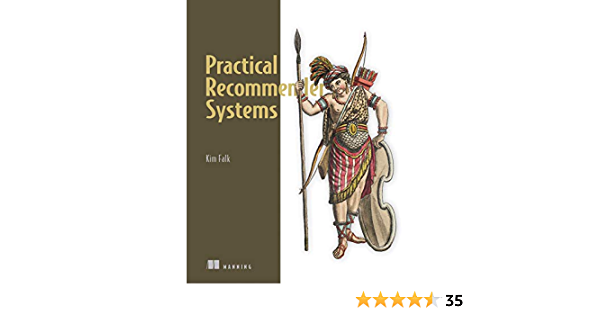
5. “Statistical Methods for Recommender Systems” by Deepak K. Agarwal and Bee-Chung Chen
“Statistical Methods for Recommender Systems” by Deepak K. Agarwal and Bee-Chung Chen is a comprehensive book that addresses the statistical challenges involved in designing algorithms for recommender systems. Recommender systems play a crucial role in web applications by ranking items based on user responses and optimizing for multiple objectives.
The book highlights two major technical challenges in recommender systems: high-dimensional prediction with sparse data and constructing high-dimensional sequential designs for data collection. It delves into current state-of-the-art methods, including adaptive sequential designs (multi-armed bandit methods), bilinear random-effects models (matrix factorization), and scalable model fitting using modern computing paradigms like MapReduce.
The authors bring their extensive experience from working with large-scale recommender systems at Yahoo! and LinkedIn, bridging the gap between theory and practice. They provide in-depth discussions and detailed explanations of the methods, illustrating complex concepts with real-world examples from applications they have been directly involved with.
This book serves as a valuable resource for researchers, practitioners, and data scientists seeking to understand and tackle the statistical challenges in recommender systems. It offers insights and practical approaches based on the authors’ expertise in the field.

6. “Recommender Systems: Legal and Ethical Issues”by Sergio Genovesi, Katharina Kaesling, and Scott Robbins
Book premiere worth watching “Recommender Systems: Legal and Ethical Issues” is an open-access contributed volume edited by Sergio Genovesi, Katharina Kaesling, and Scott Robbins. The book explores the ethical and legal foundations of policies concerning recommender systems and takes a transdisciplinary approach to address important issues related to their development, use, and integration into online ecosystems.
The volume examines the values that drive automated recommendations and highlights the potential divergence between what individuals, the companies operating the platforms, and society at large consider important. It delves into concerns about manipulation of individuals and the risks posed to personal autonomy by recommender systems.
From a legal perspective, the book evaluates the regulatory needs and responses in various legal disciplines, with a particular focus on European Union measures related to platform regulation, consumer protection, and anti-discrimination law. This aspect of the book will be of particular interest to legal scholars working on platform regulation and algorithmic decision-making.
In addition to ethical and legal perspectives, the book includes interdisciplinary work that explores various aspects of recommender systems. It incorporates specific use cases to highlight pitfalls associated with current regulatory models.
Overall, this book provides a comprehensive examination of the ethical and legal considerations surrounding recommender systems. It will be valuable for researchers, scholars, and professionals interested in understanding and addressing the challenges of regulating recommender systems within online ecosystems.
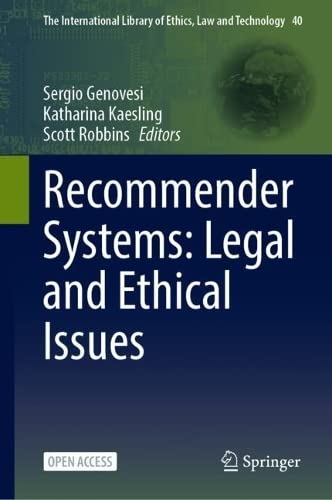
7. “Hakowanie sztucznej inteligencji” (eng. “Hacking Artificial Intelligence”) by Jerzy Surma
“Hakowanie sztucznej inteligencji” (eng. “Hacking Artificial Intelligence”) by Jerzy Surma is a book in Polish that focuses on the hacking of machine learning systems, including recommendation engines. With the increasing digitization and development of the Internet of Things, the automation of business processes and the use of intelligent decision support systems powered by artificial intelligence and advanced data analysis techniques have become crucial. However, this trend also brings significant risks and threats.
The book examines intentional interventions in the construction and operation of machine learning models, aiming to disrupt their functioning or cause them to cease operating. The potential consequences of such attacks are significant and can impact human health, business operations, the economy, and even national security.
The authors provide a holistic view of the hacking of learning systems, which are currently widely utilized in various applications. They define hacking broadly, encompassing not only attacks on operational systems but also harmful interventions during the entire life cycle of these systems, including their construction and tuning.
The book addresses both the scientific community focusing on cybersecurity and practitioners involved in building learning systems, as well as those responsible for operational risk and business continuity in organizations.
The book is divided into several parts, covering topics such as the introduction to hacking learning systems, representative attack reviews, the business dimension of attacks on learning systems, case studies, and security considerations for learning system applications.
“Hakowanie sztucznej inteligencji” provides comprehensive insights into the risks, challenges, and practical implications associated with hacking machine learning systems. It is a valuable resource for researchers, cybersecurity professionals, and practitioners involved in developing and managing artificial intelligence systems, as well as those concerned with operational risk and system resilience.

5 best introductory research papers on machine learning recommender systems
1. “A literature review and classification of recommender systems research” by Deuk Hee Park, Hyea Kyeong Kim, Il Young Choi, Jae Kyeong Kim
This paper presents a literature review and classification of recommender systems research. The authors address the lack of a comprehensive review and classification of the increasing body of academic research in the field of recommender systems. They reviewed 210 articles on recommender systems published between 2001 and 2010 in 46 journals. The articles were classified based on the year of publication, the journals they appeared in, their application fields, and the data mining techniques employed.
The 210 articles were categorized into eight application fields, including books, documents, images, movies, music, shopping, TV programs, and others. They were also classified based on the data mining techniques employed, which included association rules, clustering, decision trees, k-nearest neighbor, link analysis, neural networks, regression, and other heuristic methods.
By examining the publication years of the articles, the research provides insights into the trends in recommender systems research. The authors aim to offer practitioners and researchers a better understanding of the field and future directions for recommender systems research.
This paper serves as a valuable resource for anyone interested in recommender systems research. It offers a comprehensive review of the literature and provides insights into the trends and potential areas for future research in the field of recommender systems.
[Read also: Netflix Algorithm: How Netflix Uses AI to Improve Personalization]
2. “Hybrid Web Recommender Systems” by Robin Burke
This paper, titled “Hybrid Web Recommender Systems” by Robin Burke, explores the concept of combining different recommendation techniques to build hybrid recommender systems for adaptive web sites. The author highlights that collaborative, content-based, and knowledge-based recommendation methods each have their own strengths and weaknesses. To improve performance, researchers have started combining these techniques in hybrid recommender systems.
The paper provides a survey of two-part hybrid recommender systems, focusing on four recommendation techniques and seven hybridization strategies. The author examines and compares the implementation of 41 hybrids, including some innovative combinations. The study reveals that cascade and augmented hybrids perform well, particularly when combining two components with differing strengths.
The paper sheds light on the potential benefits of hybrid recommender systems and offers insights into the most effective strategies for combining different recommendation techniques. It serves as a valuable resource for researchers and practitioners interested in developing hybrid recommender systems for web applications.
3. “Hybrid Recommender Systems: Survey and Experiments” by Robin Burke
The paper “Hybrid Recommender Systems: Survey and Experiments” by Robin Burke explores the field of recommender systems, which are used to suggest items for users to purchase or examine based on their preferences. These systems are crucial in electronic commerce and information access, as they help users navigate large information spaces by directing them towards items that align with their needs and preferences.
The paper provides an overview of various recommendation techniques, including content-based, collaborative, knowledge-based, and other methods. It also highlights the emergence of hybrid recommenders, which combine different techniques to improve recommendation performance.
One of the hybrid recommenders introduced in the paper is called EntreeC, a system that combines knowledge-based recommendation and collaborative filtering specifically for recommending restaurants. The authors demonstrate that incorporating semantic ratings obtained from the knowledge-based component enhances the effectiveness of collaborative filtering.
The paper offers a survey of existing and potential hybrid recommenders and presents experimental evidence on the benefits of combining knowledge-based recommendation and collaborative filtering in the context of restaurant recommendations.
[Read also: Movie Recommendation System: How It Works And How To Introduce It In Your Business]
4. “Recommender systems survey” by J. Bobadilla, F. Ortega, A. Hernando, A. Gutiérrez
The paper titled “Recommender Systems Survey” by J. Bobadilla, F. Ortega, A. Hernando, and A. Gutiérrez provides an overview of recommender systems and their evolution. The authors discuss the development of recommender systems in parallel with the growth of the web and how they have incorporated different techniques over time.
Initially, recommender systems were based on demographic, content-based, and collaborative filtering methods. However, the authors note that these systems have now started to integrate social information into their algorithms. They also anticipate that in the future, recommender systems will utilize implicit, local, and personal information from the Internet of Things.
The paper offers an explanation of collaborative filtering methods and algorithms commonly used in recommender systems. It provides a classification of recommender systems based on the authors’ original framework, highlighting different categories and approaches within the field.
Furthermore, the authors identify areas for future implementation and development in recommender systems. They discuss the importance of considering past, present, and future trends in areas such as personalized recommendations, trust and reputation, context-awareness, and serendipity.
The paper serves as a survey of recommender systems, offering insights into their historical development, current practices, and future directions. It is a valuable resource for researchers and practitioners interested in the field of recommender systems and its advancements.
5. “Recommender Systems in E-Commerce” by J. Ben Schafer, Joseph Konstan, John Riedl
This paper titled “Recommender Systems in E-Commerce” explores the increasing role of recommender systems in the world of e-commerce. The authors highlight that recommender systems have evolved from being novelty features to becoming essential business tools that are transforming the way e-commerce operates. Many prominent e-commerce websites already employ recommender systems to assist customers in finding relevant products for purchase.
The paper explains that a recommender system learns from individual customer behaviors and preferences to provide personalized product recommendations. The goal is to offer customers the most valuable suggestions from the available range of products. To illustrate the impact and diversity of recommender systems, the authors analyze six e-commerce websites that utilize these systems, some even employing multiple recommender systems simultaneously.
The analysis of these examples leads to the development of a recommender system taxonomy. The taxonomy includes categorizations of the interfaces used by recommender systems to interact with customers, the underlying technologies employed to generate recommendations, and the types of inputs required from customers to enhance the system’s effectiveness.
In conclusion, the authors propose new potential applications for recommender systems in e-commerce, emphasizing the continuous evolution and expanding opportunities within this field.
This paper serves as a comprehensive overview of the significance and various aspects of recommender systems in e-commerce, providing insights and ideas for future developments in this area.
Related Posts
- Best AI for Coding: Top 10 AI Tools for Software Developers in 2025
- Types of Recommendation System For Business Growth: Your Guide
- How to Boost Your Sales with a Product Recommender Tool
- Introduction to Mojo Programming Language: New Era of AI Programming
- 10 Best Practices for Writing Software Documentation
Thank you for taking the time to read our blog post!